- Home
- Jane Smiley
Perestroika in Paris Page 4
Perestroika in Paris Read online
Page 4
But the meat market was not open. The succulent offerings in the windows were dark; the lights were off. Even the fragrance had dimmed, though it was quite rich and varied just at the base of the door. Frida felt her haunches sag in disappointment. And then she saw that the proprietor of the vegetable shop was standing in his doorway, his hands underneath his apron. He smiled and said, “Mademoiselle!”
There was a table just inside the door. Frida trotted over to the proprietor (she felt that the trot was a dog’s most self-possessed and dignified gait), stood up on her hind legs, put her paws on the table, and spit the bag onto its surface. The man looked at her, then picked it up and saw the note inside. He laughed. There would be no chicken, Frida thought, but there would be a roll, and maybe cheese. She went farther into the shop. She stood on her hind legs and looked into every bin. The man, Frida thought, was actually rather intelligent. If she paused at the bin, he put something from that bin into the bag. As a dog of the streets, she had eaten plenty of vegetables, and though it was true that she had no use for a raw potato (fried potatoes were quite a different matter), she didn’t mind green beans or carrots or even a leaf or two of romaine. And her bill didn’t go very far—a bread roll, beans, carrots, romaine, another bread roll. The man took her bill politely, smoothed the handles of the bag into a circle, and held them out. Frida opened her mouth, and he gave her the bag. Then she left the shop, heading briskly down the street as if her master were waiting for her. She could hear the man laughing as she ran.
Paras was still lying down when Frida returned, but she was awake. Raoul was perched on her rump. He had just finished telling her what he knew about the word “perestroika,” which wasn’t much, something about either always making plans or letting things turn out as they would and making the best of that. (“If that wasn’t horseracing,” Paras thought, “then what was?”) Now he was telling her about an argument he was having with another raven, who claimed the head of Benjamin Franklin, which was immediately below Raoul’s nest. “Everyone knows that a raven’s territory is spherical,” said Raoul. “It is widest around the nest, and then diminishes outward. I have almost no claim to the hillside below my nest, but the head of the statue is well within my territory, and I could make a case for the lap, too—”
Frida dropped the bag in front of Paras, and it fell open. Paras nosed out a carrot, bit it in two, and munched it down. She said, “How delicious! I’d almost given up hope. You’d think they’d plant a few of these in such a large park, but I haven’t found them.”
“I bought it,” said Frida.
“Ah, commerce! A concept, I must say, that we Aves have given the world.” Raoul flapped his wings, but it was only a flourish of self-congratulation. He didn’t fly away; rather, he sidestepped over to the bag and helped himself to a green bean. This drew the attention of Sid and Nancy, who walked out of the pond and stared. Paras took another carrot and bit it in two. Frida ate the second half, then one of the small rolls. It was fresh and delicious. “No apples?” said Paras.
“I don’t quite know what an apple is,” said Frida.
“Malus domestica,” cawed Raoul. “A waxwing will eat an apple.” He coughed as if this was an unusual affectation. “I have tasted apples.”
Sid and Nancy waddled closer, then sat down. No screaming or quacking. Frida took the second-to-last piece of bread out of the bag, carried it over to them, and dropped it. Jacques had never minded sharing his food with others. Sid ate part of the bread; then Nancy ate the rest. Sid said, “We’ve eaten apples. A child tossed us some bits just a few days ago. They’re all right.”
“I love them,” said Paras.
Frida knew this was a hint.
The next day, Frida supplied herself with another bill and went to the market earlier in the day, just when every shop on the street was opening. She of course went to the meat market first—she could hardly help herself, the fragrance was so enchanting—but the woman who kept the shop was sweeping the step. She waved her broom at Frida and said, “Ahh, shoo, shoo! Get!”
Frida backed away and sat down, still staring at some pale, fat, featherless carcasses in the window.
She felt a pat on the head; the man said, “Ah, dear girl, you have returned again! The chicken is indeed very lovely.”
Frida had found with Jacques that if she was still and steady and opened her eyes very wide, he was more likely to do as she wished, and, indeed, the man held out his hand, took her bag, and removed the bill from it. Then he went into the meat market. She stepped carefully up to the window and touched it with her nose beside a pile of meaty bones, and he put two of these in the bag, paid for them, and came out. He did not give her the bag, though. Instead, he carried it to his own shop. Frida followed him. When she was across the threshold, he took two coins from the register and said, “Mademoiselle, I owe you two euros from your previous visit.” Frida indicated that she would take something from each of the bins closest to the street. When she had spent all of her money, the bag was heavy in her jaws, and she knew she would have to set it down more than once on her way back to the Champ de Mars. But the bones motivated her.
The bag broke as soon as she set off.
The man clucked, clapped his hands, and said, “Oh dear!” And then he gave her another bag, this one sturdy.
Between them, Raoul, Paras, and Nancy identified the fruits—orange, apple, pear, another apple, lemon, banana. Paras took the two apples; Raoul had seen lemons but never tried one; and Nancy took the orange. No one knew what to do with the banana, so they left it beside the pond. Frida carried the bones to her hollowed-out retreat and gnawed them happily.
* * *
THERE WAS a human who knew that a horse lurked about the Champ de Mars. He had seen her the first morning, inside the fence around the North Pond, when she stretched and snorted and hoisted herself to her feet, then made her way to a bit of grass half hidden by some bushes. His name was Pierre, and he was the head gardener of the Champ de Mars. Pierre loved the Champ de Mars, thought it was the oddest spot in Paris—out west, right along the Seine, flat enough to have begun as a hundred-hectare training ground for the students in the École Militaire, then large enough to host horse racing (before that moved to Longchamp), then to host what was now called a world’s fair, not to mention the Tour. It was full of grass and trees and gardens and cars and ponds and trash (Pierre did the best he could with that), over a kilometer long and half a kilometer wide, peaceful sometimes, busy other times, especially in the summer, but not so much now, in the late fall.
That first morning, he’d watched the horse for a while, and his immediate instinct had been to have her caught and vanned away. But she was a beautiful horse—a rich bay with a long tail, a thick mane, and large, expressive eyes—and the more he looked at her, the more he thought that, at least for now, she gave the Champ a certain style: every landscape needs a figure in it, perhaps especially a figure that is only intermittently visible, that is mysterious and alert. He caught sight of her often, and watched her when he could. He saw from her footprints and her manure that she was jumping out of the fenced area to graze in the evenings. Perhaps the tourists didn’t notice her, or, if they did, thought that because she was inside a fence during the day she was provided by the authorities as a picturesque gesture. Perhaps his employees did notice her, but it was not for them to say anything if he didn’t. So everyone wordlessly shoveled up what she left, as they cleaned up after dogs and cats and birds and foxes and once an ocelot that had escaped from its owner on the Avenue de Suffren, a much more troublesome beast than a horse. Pierre knew he should wonder where the horse came from, and report her, but, for now, he reassured himself that he was not in Animal Control, and if they wanted her, they could come and look for her themselves.
FOUR
Although Frida didn’t like the mallards because of the smell, and Raoul continued to disdain them as common common common (you
saw them everywhere—did Paras realize they would mate with any Anatidae?), Paras considered Nancy good company, and extremely patient. Sid, Nancy said, did not live here all year round. He appeared every autumn about this time, decked out in green. He stayed with her for a while, and then flew south. He was sensitive to the cold. Winter migration was statistically the norm, but if you lived in Paris, well—Nancy cocked her head, then went on—it was an issue between them, but she was a homebody. She liked her territory. The pond had frozen over completely only one time. Down south (she had gone with him once), you had to put up with chaos. The worst of it around here, according to Nancy, was that, in addition to her own six or eight or ten eggs (one year she laid twelve), if she didn’t hide her nest well, other eggs could turn up, and there you were, you had hatched some completely alien little thing before you knew what was what. Her last bunch had just flown off a month before. Nancy pushed them out as soon as they could go—she realized that she was a bit impatient about it, but they were well cared for and strong, and she felt that she needed at least some time on her own, didn’t Paras agree? Paras of course agreed, since she liked to have a lot of time on her own.
In half a year, late in the spring, there would be another migration—only the drakes that time of year. And good to see the back of them. A drake plus ten nestlings was too much. “What were the nestlings’ names?” asked Paras idly.
Nancy shook her wings and cocked her head. She said, “I have no idea. It’s your mate who names you, not your mother.”
“For horses,” said Paras, “it’s humans. Our dams just call us ‘sonny’ or ‘honey.’ But humans don’t seem to know the difference between two horses unless they name them, so we allow it.” She confided in Nancy that, even if a horse didn’t have showy white markings, he or she always had distinctive cowlicks and dapplings and ways of moving. It was a mystery to all the racehorses that they had to wear not only jockeys but brightly colored cloths so that the humans could tell them apart. In even the most crowded race, every horse knew who was who. Some horses found the politics of it all quite nerve-racking, but, as a front-runner, Paras didn’t pay much attention to that.
Sid was a bossy one, but Nancy quacked that she could not complain, and she had never closed herself off to him, as some ducks did, not only to interlopers, but to their own mates. He was a good provider, and a duck had to be fat, because the ducklings would slim her down to nothing if she didn’t take care of herself ahead of laying time. And anyway (Nancy lifted her wings and tossed her head), Sid knew how to shake a tail feather. Quack-quack-quack. Paras found it soothing to walk around the grass, taking bites of this and that and listening to Nancy. Where, she asked, did the drakes go? Nancy had no idea. Of course, they said that they roamed far and wide—to the mountains, to the oceans, etc. But a duck had no way of knowing. Except for that one sojourn to the south, Nancy had lived in the Champ de Mars for years. It was an excellent spot, no matter what certain mallards said about other neighborhoods. There was plenty of cover, plenty of water, plenty of food. The noise didn’t bother her—she hardly heard it anymore.
“It is noisy around here,” said Paras.
Much of the noise was made by Sid, whose high-pitched mode of expression made Paras’s ears flick. Sid was in charge of the nest, and he had decided that this year, since Paras and her friends were always present, they needed to build it in a safer spot. So he marched about the pond and the neighboring groves, trying to make up his mind. “There, you see,” he said, “the outer edge is too far into the open. Very dangerous, but if we make the nest smaller, that has its dangers, too. We haven’t lost a duckling in three years. It’s a point of pride for us, and I speak for Nancy as well as myself, because we each have our duties and responsibilities, and my responsibility is the nest.” Sid stepped carefully, looked here, looked there, kept going. “Can’t be too far from the water,” said Sid. “Very vulnerable if they have to walk far. Owls at twilight, hawks during the day, foxes anytime, dogs for that matter, cats. You ask anyone, mallards are fair game.” He coughed and glanced over his shoulder and shuddered. “Rats.”
“I don’t mind rats,” said Paras. “They clean the place up.”
“They are ruthless. There has never been a rat who let an egg be!” screamed Sid. He walked up the face of a large rock, and plopped down in the sun. Sunny days were few and far between lately, but Paras didn’t much mind the rain. It was easier to live outside in all weathers than it was to be confined to a dark stall, unable to see much, but hearing every little thing, day and night. All the horses complained about being cooped up, even the least curious ones. And then, when the humans took you out, they got spooky when you were startled by something. The better riders just sat there, and said, “Ah-ah,” but a sensitive filly like Paras could feel in her very bones that their hearts were pounding. If you lived out, there wasn’t much that surprised you. Paras could see things all over the Champ de Mars—humans large and small, dogs large and small, birds of all kinds soaring and swooping. If you lived out, every noise had a reason, every sight a before and an after. No surprises. Pretty soon, Nancy joined Sid on the rock, and both of them seemed to go to sleep.
Paras stretched, shuddered all over, and stepped out into the open space. In the last few days of rain, there hadn’t been many humans around; the sunshine would bring them out, so Paras thought she should go for a little trot before they showed up. She jumped the fence and headed down the allée, head up, ears up, pace brisk. It felt good. She flicked her tail and rose into a canter. The footing was firm, wet but not at all slippery. She enjoyed the sound of her own hoofbeats. She had been bred to race thirty-two hundred meters; a good gallop gave her the opportunity to blow out her lungs and get some exercise. At the big building at the far end of the Champ, she came down to an easy walk, turned around, and trotted back, pausing here and there to take some bites of grass. The few humans running not far from her either didn’t notice her, or pretended not to notice her, but their dogs kept barking: “Who are you! What are you doing here! I never saw you before! You don’t belong here!” Paras ignored them, and if a human looked her way, she lifted her head and trotted all the more proudly. Frida said that there was a way to conduct yourself “as if” you had your own human about. You were calm and proud and never threatening, because you didn’t want to scare anyone. You kept your distance—humans did not like strange animals to come too close to them—and you did not ever look at them unless they were looking at you. In that case, you could give them a friendly glance—I would like to know you if I had the time, but I am busy at the moment. The other important thing was to be as clean as you could be, and so Paras tried to roll in wet grass as often as she could, and to stay out of the mud. Paras was a well-bred horse, so she liked to be clean, anyway.
When she got back to the pond, Frida had returned from the market. There were, of course, fragrant apples and pears, arugula, a few carrots, and an artichoke. Paras ate the artichoke first. It was a bit like taking medicine, but she enjoyed them—you couldn’t eat sweets all the time. Of course, Frida had also brought Nancy’s, and especially Sid’s, favorite item—blackberries.
It was Paras who noticed the boy.
There were occasionally boys in the Champ de Mars, and there were occasionally girls, but boys and girls were always attached to regular-sized humans. If she had ever in her life seen a solitary boy, Paras could not remember it. But now here was a boy. He was, in addition, staring at the five animals eating their treats, his feet wide apart, his hat pushed back on his head, and his hands in his pockets. As Paras watched, he took two steps toward them and stopped again.
Raoul finished his arugula and noticed the boy. He cawed several times, flew upward, and landed on Paras’s haunches. Frida said, “What are you talking about?,” because the wind was blowing in the wrong direction for her to scent him; then she saw the boy. Raoul said, “Chase him off.”
“Oh dear,” said Frida.
“What? What?” screamed Sid.
Paras knew that Sid was upset because the boy was not far from the building site of the new nest. Nancy kept her opinions to herself.
Frida said, “I saw this boy down the street from the market. I didn’t realize that he was behind me.”
“He followed you and you didn’t even notice?” cawed Raoul.
“The bag was very fragrant. I couldn’t smell anything else.”
“Chase him off,” cawed Raoul.
The boy held out his hand.
Now Raoul started walking around in small circles, cawing like mad. Twice he flapped his wings, but the boy didn’t understand the hint. He just stood there. Paras could see that Nancy and Sid were torn between eating the remaining blackberries and taking off. They kept watch on the boy and snatched a few. Frida sat. The boy took another step toward them. He was looking at Frida, but then he glanced at Paras. Frida suddenly stood up, and said to Paras, “Let’s go.” She took off, running away from the boy, toward the other side of the Tour, a less protected part of the Champ de Mars. Paras cantered after her. In a green area beyond the other pond, they stopped and looked back. Raoul had flown away; Nancy and Sid were nowhere to be seen. The boy was standing, staring down at their treats. He squatted and touched something, then stood up and walked away. In the grand panorama of the Champ de Mars, he looked very small.
* * *
PARAS HAD a dream. Perhaps it was the apples that gave her the dream, but she didn’t dream of apples—she dreamed of oats. She was standing in a summery green field with other horses, nibbling shoots of grass that grew among the yellow flowers. A gate opened, and a fellow came through, wearing a hat and carrying four buckets. He hooked the buckets to the fence, and Paras and the other horses went over and thrust their noses into the buckets and started munching on the oats. They were sweet and crunchy. When she woke up from the dream, it was early—not even the barest shimmers of light at the far end of the Champ de Mars. Frida was stretched out beside her. Paras rolled up onto her chest and then levered herself to her feet. Frida didn’t wake up.

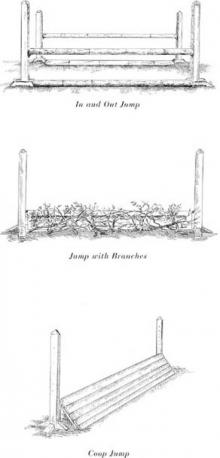 The Georges and the Jewels
The Georges and the Jewels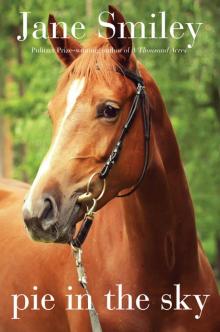 Pie in the Sky: Book Four of the Horses of Oak Valley Ranch
Pie in the Sky: Book Four of the Horses of Oak Valley Ranch Duplicate Keys
Duplicate Keys Charles Dickens
Charles Dickens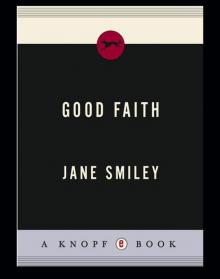 Good Faith
Good Faith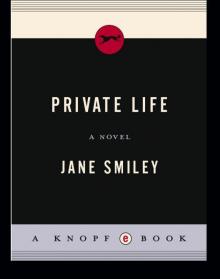 Private Life
Private Life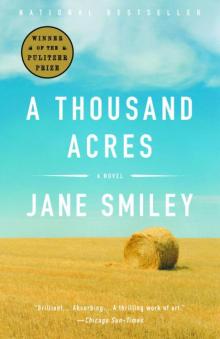 A Thousand Acres: A Novel
A Thousand Acres: A Novel The Greenlanders
The Greenlanders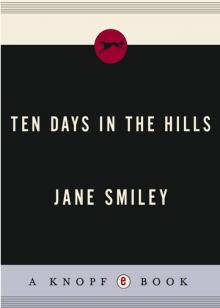 Ten Days in the Hills
Ten Days in the Hills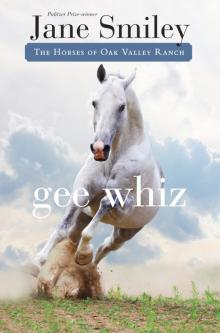 Gee Whiz: Book Five of the Horses of Oak Valley Ranch
Gee Whiz: Book Five of the Horses of Oak Valley Ranch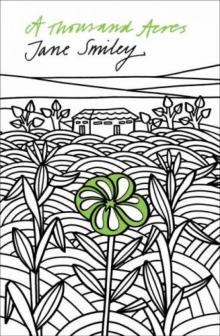 A Thousand Acres
A Thousand Acres The All-True Travels and Adventures of Lidie Newton
The All-True Travels and Adventures of Lidie Newton Ordinary Love and Good Will
Ordinary Love and Good Will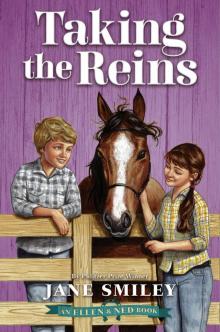 Taking the Reins (An Ellen & Ned Book)
Taking the Reins (An Ellen & Ned Book) The Man Who Invented the Computer
The Man Who Invented the Computer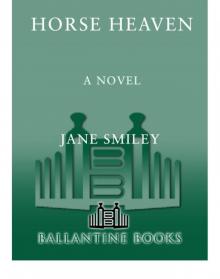 Horse Heaven
Horse Heaven The Age of Grief
The Age of Grief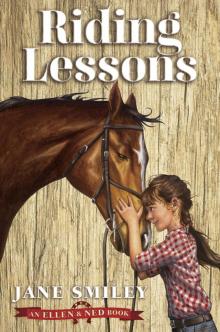 Riding Lessons
Riding Lessons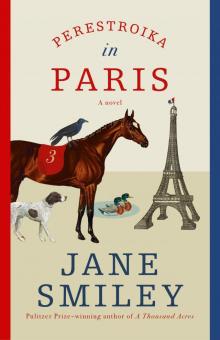 Perestroika in Paris
Perestroika in Paris A Good Horse: Book Two of the Horses of Oak Valley Ranch
A Good Horse: Book Two of the Horses of Oak Valley Ranch Saddles & Secrets (An Ellen & Ned Book)
Saddles & Secrets (An Ellen & Ned Book)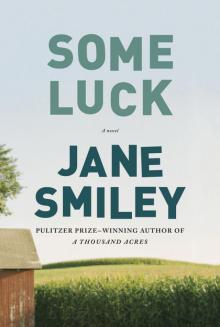 Some Luck: A Novel
Some Luck: A Novel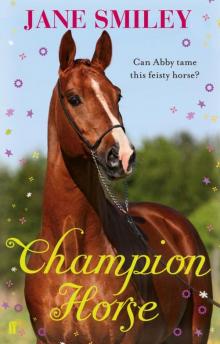 Champion Horse
Champion Horse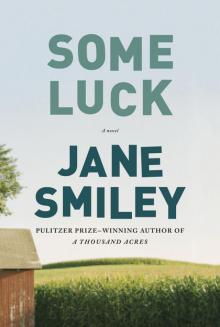 Some Luck
Some Luck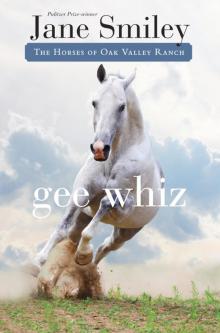 Gee Whiz
Gee Whiz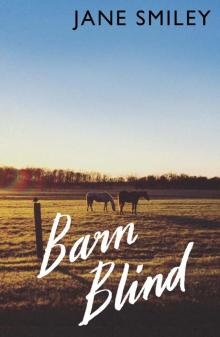 Barn Blind
Barn Blind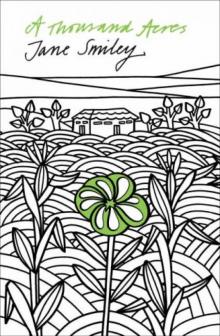 A Thousand Acres (1992 Pulitzer Prize)
A Thousand Acres (1992 Pulitzer Prize)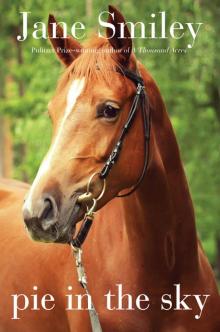 Pie in the Sky
Pie in the Sky True Blue
True Blue A Thousand Acres_A Novel
A Thousand Acres_A Novel A Good Horse
A Good Horse